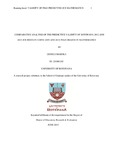Comparative analysis of the predictive validity of Botswana 2012 and 2013 JCE results using 2009 and 2010 PSLE grades in mathematics
Date
2016-07-14Author
Mareka, Gosego
Link
UnpublishedType
Masters Thesis/DissertationMetadata
Show full item recordAbstract
A significant number of students obtain better grades in mathematics in PSLE, but fail to maintain or obtain higher grades in JCE mathematics examinations. Given that content in the mathematics syllabus is arranged in a spiral format from primary level through junior secondary level, the anticipation is that the students who did well in mathematics at primary school would maintain or improve their grades at JCE level. This study investigated the validity of PSLE mathematics grades in predicting performance in JCE mathematics. The study adopted inferential survey using simple random sampling technique carried out through online random number generator. The study population is comprised of 74490 students from 207 J. S. S. in Botswana who sat for JCE mathematics examinations in 2012 and 2013. Out of this population, 50 schools were randomly selected for matching PSLE 2009 mathematics scores and JCE 2012 mathematics scores. Another 50 was randomly selected for matching PSLE 2010 mathematics scores and 2013 mathematics scores. These schools yielded a sample of 15 294 students. Data was collected from BEC and analyzed by finding regression coefficients. For all the hypotheses tested 50% or more of variance in JCE mathematics performance is explained by variance in PSLE grades. The prediction models for PSLE in the two years were determined by fitting the values of relevant parameters in the linear regression model. The finding revealed that PSLE mathematics scores were a good predictor of performance among junior secondary students in Botswana. The regression analysis also revealed that there is no significant gender and school location difference in validity of PSLE mathematics scores in predicting performance in JCE mathematics. Since performance level was generally low in both examinations, it is recommended that the MoE & SD intensify efforts in ensuring better teaching methods and learning strategies in schools through effective supervision and monitoring of schools. Discussions, implications and recommendations based on the findings were also presented.

